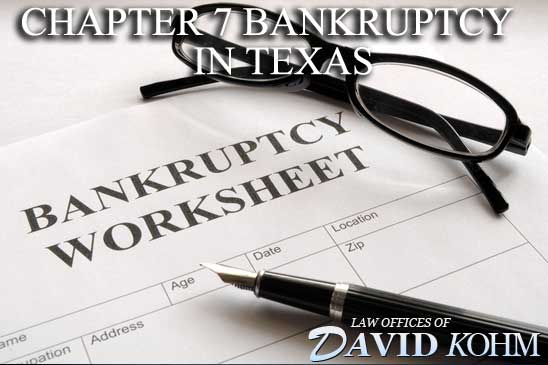If you are considering filing bankruptcy, the odds are that you are exhausted with debt and bill collectors. Our office can help you with your bankruptcy by helping you determine which chapter is best for you to file and then completing the necessary casework involved with the bankruptcy case.
The common types of bankruptcies for individuals are Chapter 7 and Chapter 13. Here we will discuss the general information about a Chapter 7 bankruptcy. If you are interested in a Chapter 13 bankruptcy, please see the bankruptcy blog posts pertaining to such proceedings.
Chapter 7 bankruptcy is ofter referred to as a “fresh start” because with the completion of the bankruptcy, you wipe out most or all of your debts. Chapter 7 bankruptcy is a liquidation of your assets to pay you and your creditors. The trustee will collect information about all of your assets and sells any assets which are not exempt. After the trustee sells the assets, they will pay you a portion of the proceeds, typically this will be the amount exempted. The majority of the remainder of the proceeds from the asset liquidation are then disbursed among your creditors.
Debts exist that cannot be discharged in a Chapter 7 bankruptcy, some of these are alimony, child support, certain taxes, and student loans. Most people that file Chapter 7 cases have large credit card debt and other unsecured bills (such as medical bills) and very few assets. In most cases a Chapter 7 bankruptcy is able to completely relieve the debtor of all of these debts.
Liquidating your assets does not mean that you will be handing over everything you have worked to obtain. You may keep certain secured debts, including your car, furniture, and house by “reaffirming” those debts. To “reaffirm a debt”, you will sign a voluntary “Reaffirmation Agreement”. If you decide that you want to keep your house, car, and/or furniture, and you sign a “Reaffirmation Agreement” for the particular debt, you will not be able to include that debt in another bankruptcy for eight years. You will still owe that debt and you must continue to make the payments in the same amount and frequency as you did prior to filing bankruptcy.
Chapter 7 Bankruptcies are attractive to many people because of the short time frame. Usually, in as little as 7 months you can be debt free and able to move on with your life.
If Chapter 7 Bankruptcy sounds like a solution you would like to explore for relief from mounting debt with a Chapter 7 Bankruptcy Lawyer, do not hesitate to call David Kohm and Associates. Calls are welcomed 24/7 and consultations are always free.











